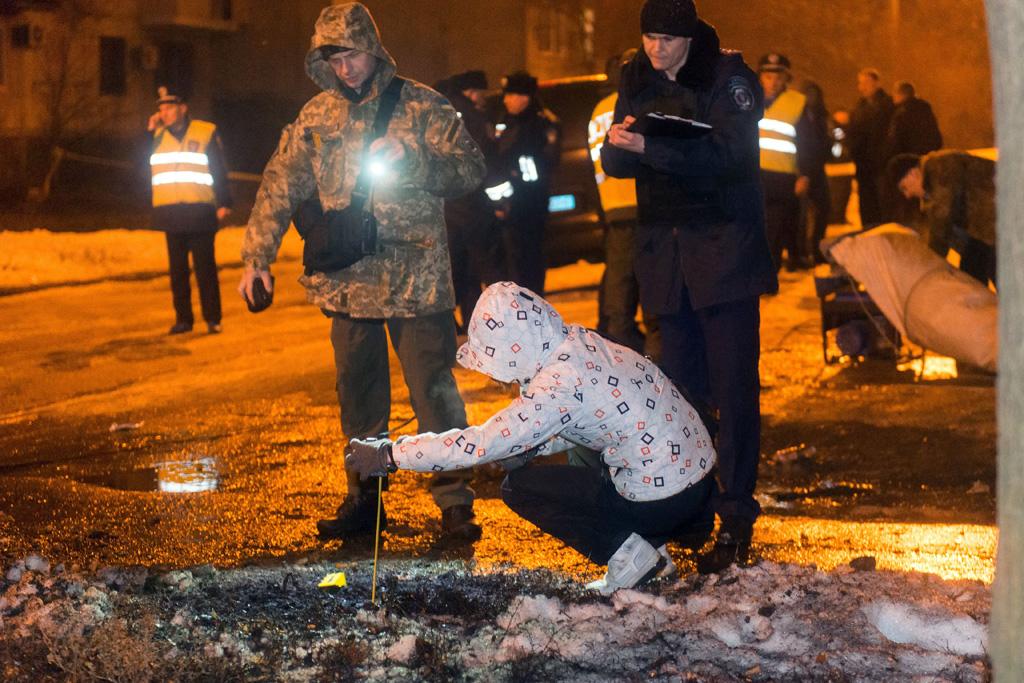Mysterious bombs are exploding in Ukraine — and not in the war-torn east
Police examine the site of a blast in the northeastern Ukrainian city of Kharkiv on Jan. 19, 2015.
KYIV, Ukraine — More than a dozen people were injured late Monday when a grenade blast rocked a courthouse in the eastern Ukrainian city of Kharkiv, the latest in a recent series of mysterious and alarmingly consistent explosions in cities outside the region’s immediate conflict zone.
They’ve occurred most frequently in Kharkiv, just north of where Ukrainian forces have been fighting pro-Russian insurgents for months, and the southern port city of Odessa. Both cities are predominantly Russian-speaking and experienced their own failed separatist movements earlier this year.
More from GlobalPost: In Ukraine the fight continues, and not just in Crimea (VIDEO)
Top officials here think it’s a campaign aimed at destabilizing those potentially vulnerable areas, which are located at least around 150 miles from the epicenter of violence in the Donetsk and Luhansk regions.
Blasts have also occurred in Mariupol, just an hour’s drive south of Donetsk, and in the capital Kyiv, some 450 miles away.
Markiyan Lubkivsky, a senior adviser in Ukraine’s security service, the SBU, blamed Monday’s attack on “our homegrown traitors, the pro-Russian elements,” and said he saw “a link” to previous incidents.
“We have no doubt this was a well-organized system which is directed from across the border from Russia,” he told Reuters Tuesday.
The same day the Ukrainian military said it had come under attack in the east from Russian troops, who the Ukrainians claimed had crossed the border a day earlier.
But the attacks occurring in non-conflict areas mostly appear to be targeted at the offices of pro-Ukrainian political and social organizations, causing injuries but no deaths. However, police said Monday’s attack, which reportedly injured several members of nationalist group Right Sector, was aimed at people, Reuters reported.
It wasn’t, however, the only such incident.
When an unknown assailant threw a grenade at a group of parliamentarians in Kyiv late last month, the chief of Ukraine’s National Security Council blamed “aggressors … push[ing] a cruel terrorist war to all the regions of the country,” according to Ukrainian news wire Interfax.
The Kremlin regularly denies claims that it’s fueling the war in eastern Ukraine — where well-armed rebels are currently facing off against Ukrainian forces over the symbolic Donetsk airport — or attempting to destabilize its smaller neighbor in any other way.
The SBU, however, regularly implicates Russian intelligence and security agents in diversion and sabotage.
More recently, in mid-December, the service claimed its officers thwarted an alleged attempt by a 30-year-old Luhansk woman to plant a powerful explosive in central Kyiv.
Whatever the case, the unsettling consistency of those attacks — or reports of authorities allegedly uncovering another plot — has left many concerned over whether the war is creeping beyond its conventional boundaries.
It’s also raised questions about the effectiveness of the security services, particularly the SBU, which observers have long claimed has been infiltrated by Russian agents.
Mykola Malomuzh, a security expert and former director of Ukraine’s foreign intelligence, says the intelligence services here also face a long road ahead in training themselves for the new circumstances.
“The SBU is partially working, but the system of intelligence, counterintelligence and prevention is so far insufficient,” he told the online news outlet Obozrevatel earlier this month.
Meanwhile, in eastern Ukraine, violence appears to be worsening in the rebel stronghold of Donetsk, once a vibrant city of 1 million people but now a desolate war zone marked by regular shelling and mounting civilian casualties.
A dispatch by Human Rights Watch researcher Ole Solvang on Monday detailed how last weekend’s artillery barrages were the worst he’s “heard since the outbreak of war in the spring of 2014.”
“From the city center we could hear the sounds of outgoing and incoming artillery literally every few seconds for several hours Saturday evening and Sunday morning,” Solvang wrote.
A new round of peace talks in Berlin — involving Russia, Ukraine, France and Germany — is set for Wednesday, according to a Reuters report. But given last week’s aborted peace summit in Kazakhstan, it remains unclear how successful it will be.
We want to hear your feedback so we can keep improving our website, theworld.org. Please fill out this quick survey and let us know your thoughts (your answers will be anonymous). Thanks for your time!
